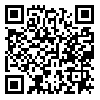Volume 22, Issue 4 (December 2024)
Iranian Rehabilitation Journal 2024, 22(4): 627-638 |
Back to browse issues page
Download citation:
BibTeX | RIS | EndNote | Medlars | ProCite | Reference Manager | RefWorks
Send citation to:



BibTeX | RIS | EndNote | Medlars | ProCite | Reference Manager | RefWorks
Send citation to:
Al- Hamoodi A A N, Falah M A, Al-Ghrebawi R H. The Relationship Between Sleep Pattern Habits with Severity of Disruptive Behaviors Among Elementary School Children. Iranian Rehabilitation Journal 2024; 22 (4) :627-638
URL: http://irj.uswr.ac.ir/article-1-2291-en.html
URL: http://irj.uswr.ac.ir/article-1-2291-en.html
1- Department of Mental and Psychiatric Health Nursing, Faculty of Nursing, University of Kufa, Kufa, Iraq.
2- Department of Community Health, Faculty of Nursing, University of Kufa, Kufa, Iraq.
2- Department of Community Health, Faculty of Nursing, University of Kufa, Kufa, Iraq.
Abstract: (5010 Views)
Objectives: Sleep patterns significantly influence the physical, psychological, and social health of children, with irregularities correlating with behavioral issues like aggression. Studies highlight the association between disrupted sleep pattern and increased aggression in elementary school children, emphasizing the need for interventions promoting healthy sleep habits. This study aims to detect the relationship between sleep pattern habits and disruptive behaviors among children of elementary schools.
Methods: A correlational study was conducted in Al-Najaf elementary schools, focusing on disruptive behaviors among 198 children. The study data were collected through a refined Arabic questionnaire and sleep habits scale, revealing severity of disruptive behaviors and personal information variables. Tools’ validity was confirmed by experts, showing high reliability (Cronbach α=0.91).
Results: The study examined elementary school children diagnosed with disruptive behaviors in Al-Najaf Province, Iraq. Most participants were male (60.6%), aged 8-10 years (43.9%), and primarily in the first education grade (24.2%). Sleep patterns during weekends and holidays exceeded the normal range (47%), with disruptions reported by over half of the samples (56.1%). No significant correlation was found between disruptive behavior and personal traits, except with variable age, which had a significant correlation (P=0.003). Sleep patterns did not significantly correlate with disruptive behavior, although a weak negative correlation was found between age and education grade.
Discussion: Disruptive behaviors are prevalent among elementary school children in Al-Najaf Province, albeit mildly impactful and diminishing with increasing age. According to the current result, these behaviors are not primarily linked to personal traits and show no or little significant correlation with sleep patterns.
Methods: A correlational study was conducted in Al-Najaf elementary schools, focusing on disruptive behaviors among 198 children. The study data were collected through a refined Arabic questionnaire and sleep habits scale, revealing severity of disruptive behaviors and personal information variables. Tools’ validity was confirmed by experts, showing high reliability (Cronbach α=0.91).
Results: The study examined elementary school children diagnosed with disruptive behaviors in Al-Najaf Province, Iraq. Most participants were male (60.6%), aged 8-10 years (43.9%), and primarily in the first education grade (24.2%). Sleep patterns during weekends and holidays exceeded the normal range (47%), with disruptions reported by over half of the samples (56.1%). No significant correlation was found between disruptive behavior and personal traits, except with variable age, which had a significant correlation (P=0.003). Sleep patterns did not significantly correlate with disruptive behavior, although a weak negative correlation was found between age and education grade.
Discussion: Disruptive behaviors are prevalent among elementary school children in Al-Najaf Province, albeit mildly impactful and diminishing with increasing age. According to the current result, these behaviors are not primarily linked to personal traits and show no or little significant correlation with sleep patterns.
Article type: Original Research Articles |
Subject:
Nursing
Received: 2024/06/22 | Accepted: 2024/08/4 | Published: 2024/12/20
Received: 2024/06/22 | Accepted: 2024/08/4 | Published: 2024/12/20
Send email to the article author








